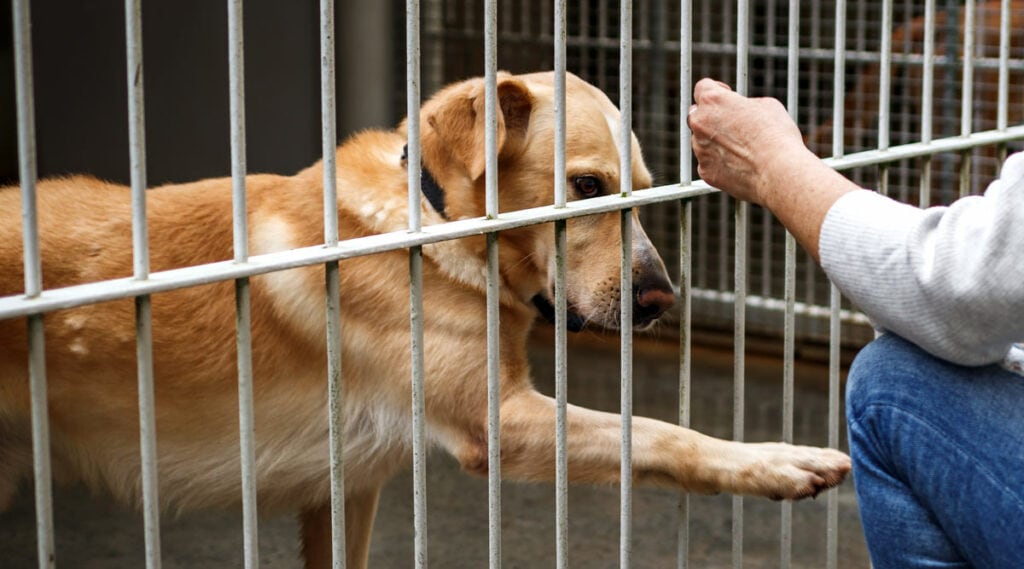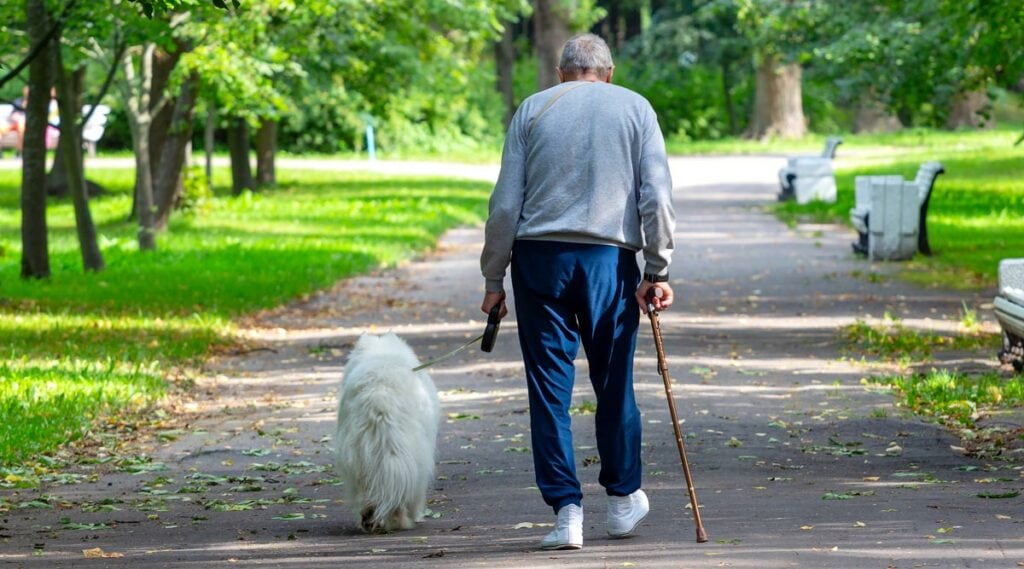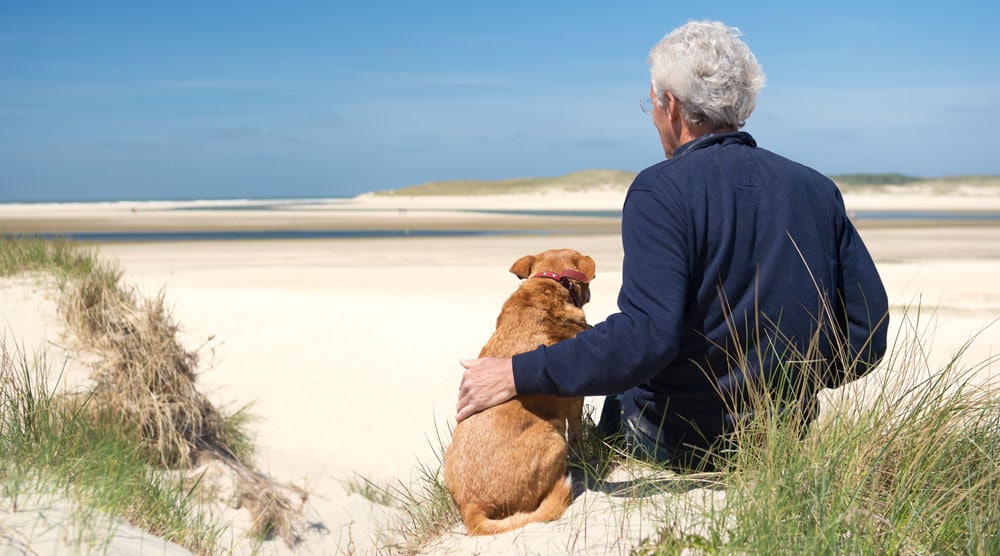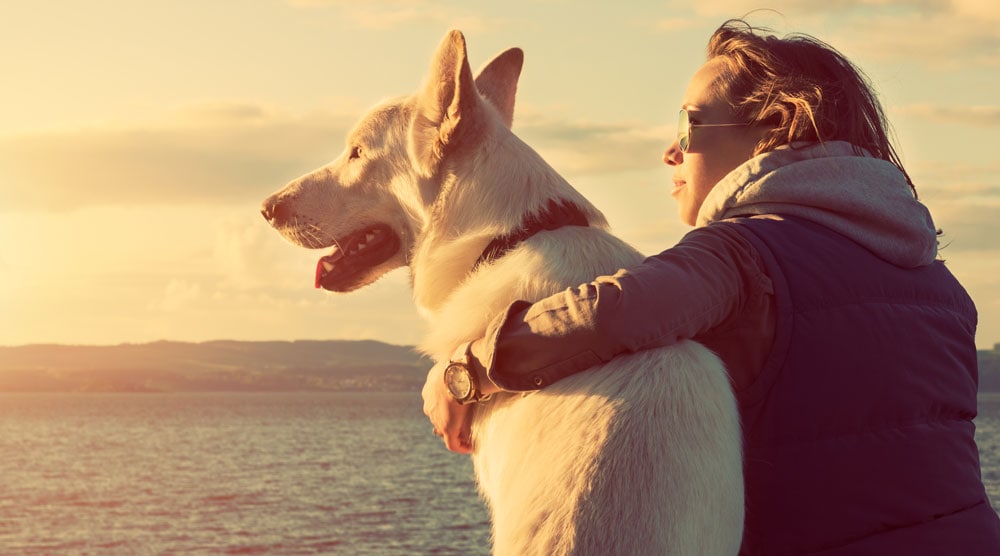If you’re thinking of getting a dog but are worried about your age, then this answer to a reader’s question may help.
I’m considering getting a new dog, but don’t know whether I am too old. Do you think anyone is ever too old to get a dog?
Margaret
Dear Margaret,
Firstly, credit to you for putting the welfare of your potential pet first. Many people – young or old – give in to the temptation of owning a dog without really thinking about whether it’s the right thing to do.
The quick answer is that I don’t think there is a defined age when you shouldn’t get a dog, but as you get older there are certainly some considerations you should take into account.
These might include:
- Which breed and age of dog would be most suitable for my age, health, and lifestyle?
- Do I have the energy to keep up with the dog’s exercise and mental stimulation needs?
- Do I have the money available to care for a dog, including any potential vet bills?
- Do I have the time to train a dog?
- Do I have a friend or family member who is willing to care for the dog should it outlive me?
Pets are proven to provide wonderful benefits to older people. Aside from the regular benefits of caring for a dog, pets can potentially reduce blood pressure, lower the chances of depression, provide social opportunities, and increase activity levels. They also help to fight loneliness, as they provide companionship and can be a great way to meet other dog walkers.
Caring for a dog also provides spiritual and well-being benefits. A recent study that aimed to uncover the themes in relationships between a dog and a senior owner found that:
“While each participating pair had a unique and nuanced relationship, four predominant themes cut across all of the participants’ relationships with their dogs. The themes of beloved attachment, unconditional love, steadfast friendship, and joyful responsibility […] evidences the role of dogs in the well-being and quality of life of older adults.”
Grow Old Along With Me: The Meaning of Dogs in Seniors’ Lives, 2019
The main question is whether you’re able to provide a wonderful life and home for your dog. This is less about your age and more about your capabilities and health.
Are you able to give your dog a daily walk? If you get a puppy, are you able to take it outside multiple times a day during house training? Are you at home enough to give your dog the attention it needs? And can you afford pet insurance, food, vet bills and the other costs associated with owning a dog? Do you already have another dog and would another be too many for your household? These are all questions that only you can answer.
If your physical condition prevents you from giving your dog enough exercise then this could also be a problem.
You certainly don’t need to be highly active to give a dog a great life. Some dogs need more exercise than others, so if you adopt a low-energy breed or older dog you wouldn’t need to walk it for as long each day. But it’s important to be honest about whether you’re in a position to properly care for a pet.
Puppy or Adult Rescue/Shelter Dog?

At TheDogClinic.com, we think adopting a rescue dog is an amazing thing to do. We appreciate not everyone wants to miss out on the puppy stage, but there are plenty of wonderful puppies available for adoption too!
If you decide to get a puppy, however, you need to be able to deal with the endless energy they bring to the house. New puppies require constant attention, training classes, and house training.
“In my experience, one of the biggest challenges for puppy parents is sleepless nights!” says dog trainer Rebecca Morello. “This is especially true for my older clients who may not have the energy to be up 2-3 times a night for toilet training and settling their puppy to sleep.”
Also, the biggest issue if you get a puppy is not your age now, but in 10-15 years’ time. Will you still be able to give the dog the exercise and attention it needs? The average dog will live to over 10 years, so this is something you should consider carefully.
Benefits of Adopting Adult Rescue/Shelter Dog

As a puppy can be tiring and overwhelming to look after, you might want to consider adopting an older dog from a shelter instead.
Dogs in shelters are desperate for new homes, and they are generally less energetic than puppies. As they are already part-way through their life, they may also be more suitable.
Other benefits of adopting an adult dog can include:
- The shelter will be able to help you choose a dog that matches your age, health, and lifestyle
- Adult dogs already have a developed personality that makes it easier to find the right dog for you
- Dogs that have passed adolescence tend to have less energy and are often easier to train
- Adult dogs are fully grown, so you know their final size
- I’ve personally found that nothing beats the satisfaction of helping a dog in need!
Unfortunately, some dog shelters have a blanket ban on people above a certain age adopting. I can see the logic behind this, but I also think that age alone is not a good way of judging whether someone is suitable for adoption. You’ll need to contact individual shelters to discuss their policies.
Concerns for Seniors When Considering a Dog
Can I Keep Up With The Dog’s Exercise Needs?

A common concern I hear from senior people is that they won’t be able to keep up with a dog’s exercise needs. Some breeds (like the Border Collie) can need two hours of exercise every day, so this is an understandable worry!
The good news is that you can often find a dog that meets your lifestyle and fitness abilities. For example, some breeds, such as the Shih Tzu or Greyhound, can be happy with around 30-45 minutes of light exercise per day.
Here’s a table from our article “How Much Exercise Do Dogs Need?” to give you an idea of which breeds need the most exercise:
| Breed | Daily Exercise |
|---|---|
| Bichon Frise, Lhasa Apso, Shih Tzu, Miniature Dachshund, Yorkshire Terrier, English Bulldog | 30-45 minutes |
| Cavalier King Charles Spaniel, Pug, Miniature Schnauzer, Toy/Miniature Poodles, Shetland Sheepdog | 45-60 minutes |
| Cairn Terrier, Cocker Spaniel, Bassett Hound, Tibetan Terrier, Whippet, West Highland Terrier | 60-80 minutes |
| Golden Retriever, Siberian Husky | 80-100 minutes |
| Border Terrier, Staffordshire Bull Terrier, Great Dane | 100-120 minutes |
| Border Collie, Dalmatian, German Shepherd, English Springer Spaniel, Labrador Retriever, Rottweiler, Weimaraner | More than 2 hours |
Data provided by the Peoples Dispensary for Sick Animals. Please keep in mind that the exercise amount is a guideline only – it varies depending on the dog’s size, physical fitness, health, age and other factors.
It’s also important to take into account the dog’s age. Young dogs are often energetic and need more exercise compared with adult dogs. Senior dogs often need less exercise too – and there are many wonderful older dogs waiting in shelters.
Can I Afford A Dog?

Something that’s often overlooked when adopting a dog is the ongoing cost. I’ve found that many people think about the one-off costs – adoption fees, beds, bowls, and so on- but forget about how much a dog costs to keep each month.
I’ve written a complete guide to the true cost of owning a dog, but here are a few examples of ongoing costs to think about:
- Food
- Flea, tick, and heartworm prevention
- Grooming
- Equipment replacement
- Treats and dental chews
- Medication and supplements
- Routine vet checkups and vaccinations
- Dog sitters when you’re away from home
Of course, this list doesn’t include emergency veterinary bills, such as if your dog needs surgery or urgent treatment. These situations are not uncommon but can cost thousands if your pet insurance doesn’t cover them.
The bottom line is that dogs can be expensive. It’s important to consider whether you’ll be able to afford to meet your dog’s needs both now and in the future.
Will A Dog Cause Me To Fall?

Falling is a serious concern for elderly people who are considering adopting a dog. In fact, a 2010 study estimated that there were over 85,000 falls in the US associated with dogs or cats – and the risk was highest for people over the age of 75.
The three most common reasons that a dog might cause a senior person to fall are:
- The dog pulls the person over when on a leash
- The dog accidentally gets under the person’s feet and trips them up
- The person chases the dog and trips over
The study I mentioned above found that around 31% of falls caused by dogs were due to tripping over, while 21% were caused by being pushed or pulled. So, both are a significant risk.
Many people recommend that older people choose smaller dog breeds to make it less likely for them to be pulled over. This is good advice and certainly makes the dog easier to handle, although it’s worth noting that smaller dogs are more likely to accidentally trip you up.
To reduce the risk of being tripped, the key is to make sure you’re always aware of where your dog is and what they are doing. You can then take steps to mitigate the risk.
For example, if you’re going to be cooking or doing anything that takes up your attention while standing, shut the dog behind a baby gate or in their crate (assuming they are crate trained) so there is no chance of them getting underfoot.
Tip: There are additional reasons to choose a smaller breed. Small dogs are generally cheaper to keep, as they need less food and smaller equipment. It’s also very handy to be able to pick up your dog in difficult or dangerous situations.
What Happens If I Can’t Care For My Dog Anymore?

A sad reality for any dog owner is that there is a chance your pet may outlive you. This is often why people in their senior years hesitate to adopt a dog, although there are ways to ease this worry.
Firstly, you can reduce the risk by adopting an adult or senior dog. Many of these dogs are desperate for a home to enjoy their final years and can make wonderful companions.
Secondly, make a plan for what happens to your dog if can’t care for them anymore. The best option would be to ask a friend or family member to adopt your dog in this situation.
If they agree, then take the time to write out care instructions (including food type, medications, vets and routines) and leave it in a place that’s easy to find. Dogs are expensive, so consider setting aside money for your pet’s future care too.
I also recommend that your dog regularly spends time with the person, including overnight stays, so that they are familiar with the people and environment.
If you don’t know anyone who is able to care for your dog, then you may need to consider finding a no-kill pet rescue to take them. Make sure friends and family members are aware of which shelter you’ve chosen.
Final Thoughts
Ultimately, if you feel you can care for a dog properly (including financially) for the rest of its life then they can provide great companionship. It really doesn’t come down to age, but your own physical condition and circumstances.
Hope that helps!





My little Norffie is getting very frail. I am 73 and walk a lot. If I lose my little darling should I get a puppy?
I have always had dogs and I know well what a puppy and a young dog needs.and love the laughter and energy of young dogs
If I get a puppy which I will socialice with children, pussy cats and let him stay with friends so he knows and is loved by others would I be selfish in getting another doggie?
Would never do it with an old soul but …..if I knew my young dog was going to a loved home when I died would that be bad if I was sure he was where I thought would be good for him?
Any advice appreciated.
Doggies always a treasure and faithful and loving, but they can adapt when young.
Again, I understand what little ones need and their energy and can deal with it.
Love dogs. Have never been without them. My little dear one so close and funnny.
Yours
Bobby
Hi Bobby,
Thanks for your question. Unfortunately, only you can really answer whether it would be right to get a puppy. Make sure you consider how much exercise the dog needs, vet bills, insurance, training costs – and how your ability to provide for the dog will change as both of you get older.
If you’re planning to leave your dog with another owner in the case of your death, you also need to consider whether it’s fair to ask them to take on the dog – and whether their lifestyle is compatible. Can you really guarantee that your dog will have a loving home in 5-10 years time if something happened to you? Or is the dog likely to end up in a shelter?
I would also look into adopting an older rescue dog. I understand you love the energy of a puppy, but there are loads of wonderful dogs waiting for adoption, so you can choose one that’s most suitable for your lifestyle.
I hope that helps!